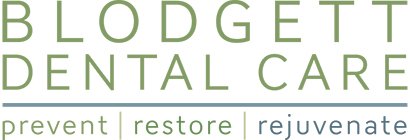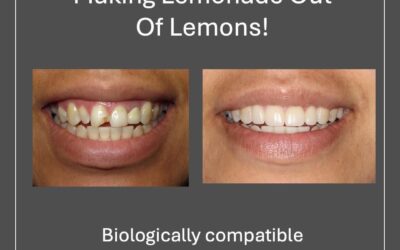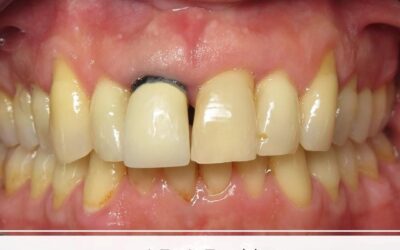How to Tell if You Have Gum Disease and
How to Treat It
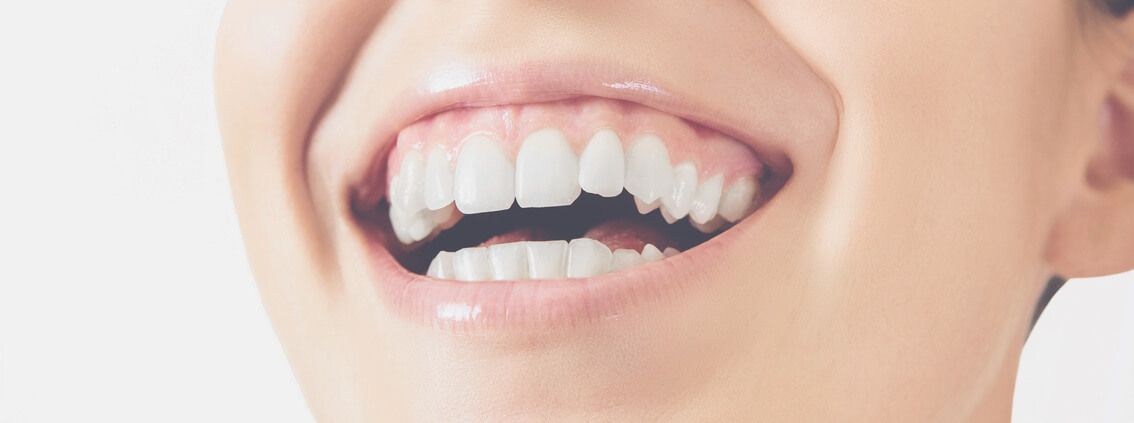
Most of us don’t think about our gum health very often. Instead, we worry about cavities, tooth stains, and other more visible dental issues. All of those things are important, but I’ll let you in on a dental secret: you can’t have healthy teeth without healthy gums!
In this post, I’ll explain why. I’ll also tell you how to recognize the most common signs and symptoms of gum disease and other gum issues, and what you can do about it.
If your gums aren’t healthy, you have plenty of options, from easy, at-home treatments to high-tech dental procedures for more advanced issues. But don’t worry — I won’t recommend anything that involves scalpels or painful gum surgery! That is not the Blodgett Dental Care way! I’ve made it my mission to offer painless, minimally invasive options for treating dental problems like gum disease.
Why Is Gum Health Important?
Healthy gums are important for two reasons
1. They protect your teeth.
2. They affect the overall health of your whole body.
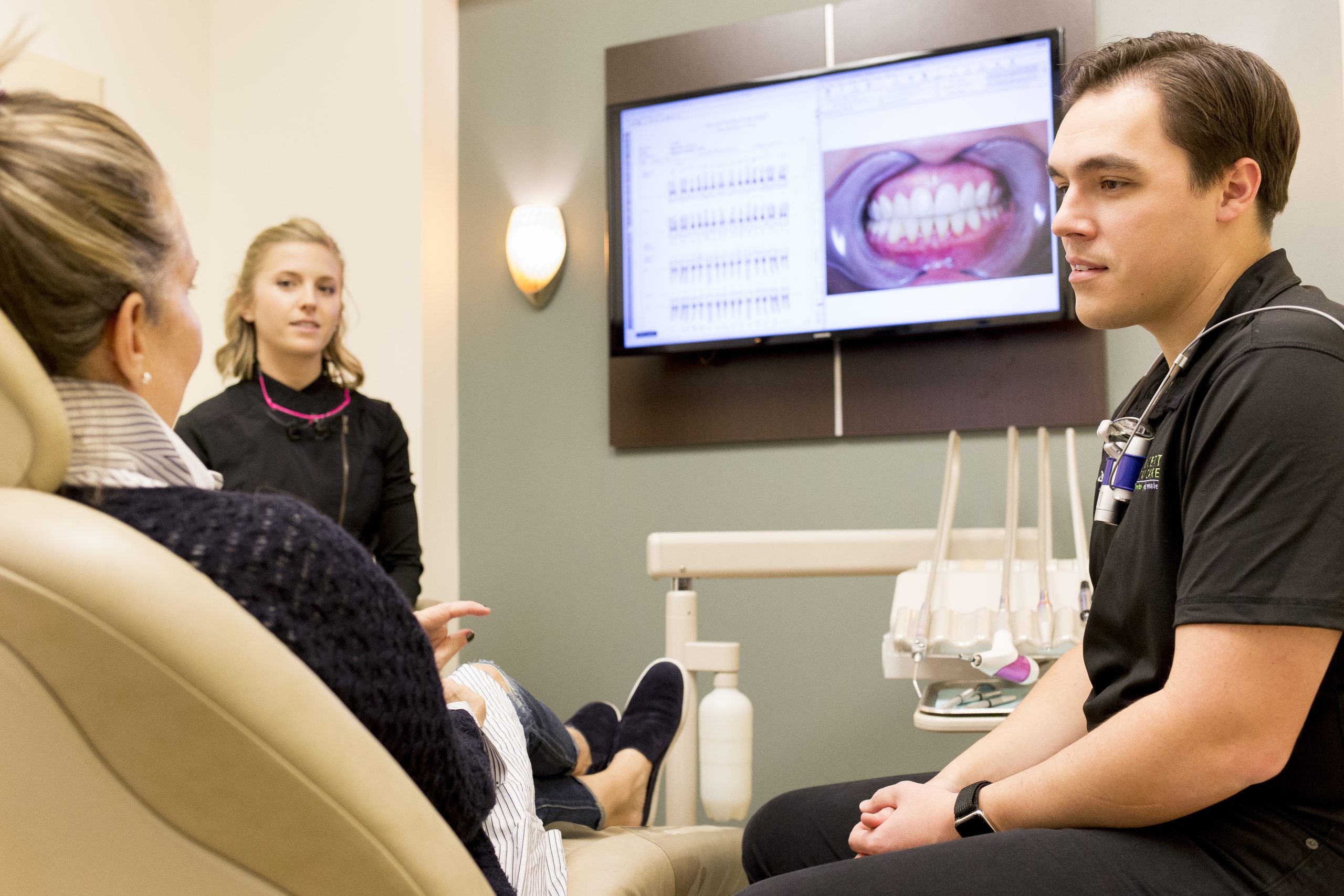
Keep Your Teeth Strong
Think about it: along with your jaw bone, your gums surround the roots of all of your teeth, holding them in place. If your gums become infected, they can’t protect the teeth and bone that they cover the way they should. If left untreated, gum disease can eventually lead to bone infection, tooth decay and/or even tooth loss.
If you’ve lost teeth to gum disease, we have great options for replacing them with something that looks and feels natural, but nothing beats real teeth. The best way to keep all your teeth is to take good care of your gums!
Overall Wellness
The link between healthy gums and a healthy body is much stronger than most people realize. In fact, problems in your mouth affect your whole body.
Gum disease is the result of your body’s response to the presence of infectious bacteria in your mouth. These bacteria don’t just damage your gums; they can also damage the rest of your body. And the inflammation caused by those bacteria can have a serious negative effect on your general health.
Think about it. If the palm of your hand bled when you touched it, you would be VERY concerned about the irritation and infection in that hand! Well, the truth is that for most people with active gum disease, if you add up all of the infected surfaces of their gums and laid them out flat, it would literally be the size of the palm of your hand. That’s a LOT of infection!!
Gum disease has been linked to a variety of health issues, including heart disease and diabetes. There is also evidence gum disease may even be linked to other conditions, like dementia, rheumatoid arthritis, respiratory infections, and premature birth.
Signs & Symptoms of Gum Disease
So how can you tell if your gums are healthy or not? There are a few common symptoms you can look for:
- Bleeding gums during brushing or flossing
- Swollen, tender gum tissue
- Bad breath that won’t go away
- Receding gums
- Toothaches
- Loose teeth (a potential sign of very serious, advanced gum disease)
If you’re concerned about the health of your gums, the best thing you can do is talk to your dentist (preferably a holistically minded one!). It’s the only way to know for sure. When you go in for a dental exam, your dentist looks at your teeth, gums, and the bone supporting your teeth (which is visible on an X-ray). This initial information will help to establish if you are experiencing any of the symptoms of gum disease. Your dentist should also take measurements of periodontal pockets–the little spaces between your teeth and gums that can widen when gum disease sets in. Healthy measurements are 2 to 3mm and there is NO bleeding. Measurements of 4+mm and/or bleeding indicate that there is irritation and infection. Seeking effective antibacterial management early is the key to prevention.
Types of Gum Diseases
Gum disease (also known as periodontal disease) comes in many forms. Some are more dangerous than others, but all of them can negatively affect your health if left untreated.
Let’s look at the two most common types.
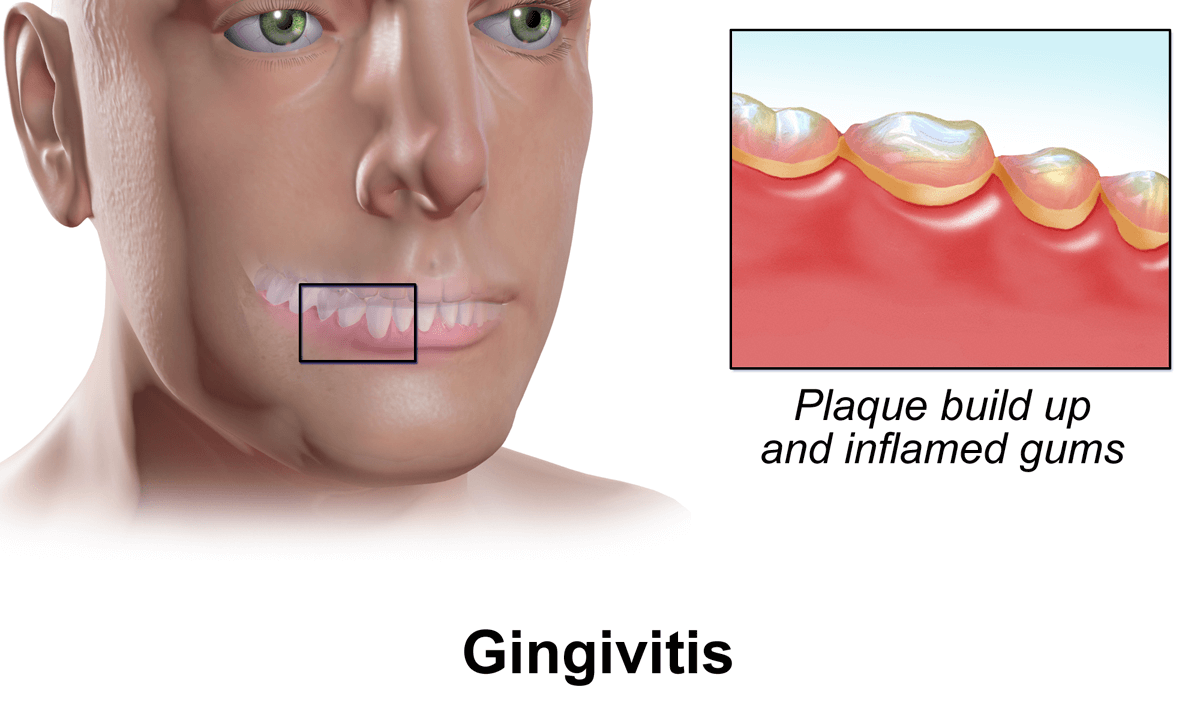
Photo: BruceBlaus
Gingivitis
Think of gingivitis as early stage gum disease. People with gingivitis usually notice painful, swollen, inflamed gums that bleed easily. Like all periodontal disease, it’s the result of your body’s response to the disease-causing bacteria in your mouth.
Gingivitis is gum disease that is limited primarily to the gums and not yet affecting the supporting jaw bone. Although at this stage it doesn’t damage the underlying structures of your teeth and bones, if it’s not treated effectively, gingivitis can progress to more advanced gum disease, which can have serious implications for your oral health and total body health.
Periodontitis
What happens when you don’t take care of gingivitis early? It can turn into periodontitis, where bone loss and systemic infection become more serious.
As bone structure is lost, bigger and bigger periodontal pockets open up. The more infected and inflamed the tissues become, the more bacteria are pouring into your body’s blood supply and lymph system. Unfortunately, it’s impossible to clean out those pockets with regular brushing, flossing, and dental cleanings, so they accumulate more bacteria and more bone is lost. When enough bone is lost, that’s when your teeth can start to become loose.
That’s why it’s so important to treat all forms of gum disease as early as possible. Don’t wait until the damage is irreversible. Gum disease is completely treatable. Dentists like me can and do treat gum disease every day.
What Are Your Treatment Options?
If you have gum disease, don’t worry — you have effective, minimally invasive options. The best treatment for you depends on a variety of factors, including the severity of your gum disease.
Simple At-Home Treatments
For mild gum disease
If you’re diagnosed with a mild form of gum disease, like gingivitis, the best solution may be to get a thorough professional cleaning from your dentist and a simple at-home treatment.
Sometimes all it takes is better brushing and flossing to make sure you’re keeping your gums clean and not letting bacteria accumulate there. Your dentist can show you the proper way to brush and floss, and might even suggest a gentle electric toothbrush. Oil pulling with organic coconut oil is also an effective way to minimize the bacterial load in your gums.
For slightly more serious gingivitis, I usually recommend the Perio Protect method in which we can make you custom dental trays, and send you home with a low concentration hydrogen peroxide gel that you place in the trays. The Perio Protect method is great because it’s very effective, completely non-invasive, and can even literally whiten your teeth and freshen your breath while it fights disease-causing bacteria!
Laser Gum Disease Treatment
For advanced gum disease
For patients whose gum disease has progressed beyond mild to moderate inflammation, the only option used to be painful, uncomfortable surgery involving cutting away diseased tissue with a scalpel. Not anymore! Since 2005, Blodgett Dental Care has been offering a unique regenerative laser-assisted technique to save teeth. That procedure is called Laser Assisted New Attachment Procedure (LANAP®).
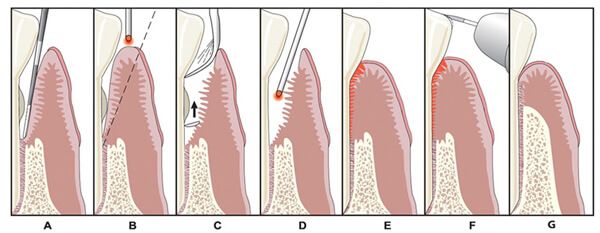
By targeting the specific bacteria involved in the gum disease process, LANAP results in less pain and a much faster recovery time than traditional surgery. In fact, most patients report not needing any pain medication following the procedure beyond Advil or Aleve. Because the laser we use is so sophisticated, LANAP is also safer and more precise than traditional gum surgery. Not only does it result in fewer complications; it actually promotes bone and tissue regrowth after the procedure, which can actually save teeth from needing to be removed!
Dental Implants
To replace lost teeth
If you’ve already lost one or more teeth to gum disease, dental implants are the best way to get your real smile back the way it was. They’re completely functional and natural looking — indistinguishable from your original teeth.
Unlike dentures, dental implants actually encourage soft tissue and bone growth. Plus dentures can be uncomfortable and inconvenient. Dental implants are a safe, healthy, and long-term option.
Gum Rejuvenation
To fix receding gums
If you’ve experienced some gum recession, we can help with that, too. Pinhole Gum Rejuvenation is a simple, minimally-invasive alternative to traditional gum surgery. Traditional surgery involves cutting your gums and stitching them back up and results in a long recovery and lots of soreness. Pinhole Gum Rejuvenation is completely different! Since there are no incisions or stitches, most patients only need Advil after the procedure and feel normal the next day. Plus, you’ll see and feel the results immediately! Learn more about how Pinhole Gum Rejuvenation works.
“An ounce of prevention is worth a pound of cure.”
-Benjamin Franklin
When it comes to gum disease, that couldn’t be truer. We have plenty of great treatment options for people already suffering from gum disease, but the best way to fight any disease is prevention.
If you beat gum disease in the past or have never had it before, your best bet is to keep your mouth clean and healthy so you can avoid gingivitis and periodontitis in the future.
A healthy mouth begins with daily oral care and taking care of your whole wellness.
- Brush twice a day
- Floss once a day
- Support your diet with effective nutritional supplements
- Get regular dental cleanings and checkups
A professional cleaning can remove built-up plaque, tartar, and bacteria that regular brushing and flossing can’t.
Who Gets Gum Disease?
Who’s at risk? There are a few factors that can increase your risk of developing gingivitis and periodontitis, including:
- Genetics – If either of your parents suffers from gum disease, you are at a significantly higher risk of developing gum disease, too.
- Tobacco use – People who smoke or chew tobacco are at a much higher risk for gum disease, and smoking can lower your chances of successful treatment.
- Chronic immune disorders – These conditions weaken your immune system’s ability to fight infections.
- Older age – Older people, whose immune systems are naturally slower, should be extra careful too.
- Diabetes – Diabetes makes people more likely to develop infections, including gum disease, due to how it complicates the blood flow through the tiny vessels in your mouth.
- Bad oral health habits – If you’re not brushing and flossing properly, bacteria is allowed to build up and grow along and under the gum line.
- Poor nutrition – When you’re not eating right, you’re not giving your body the tools it needs to protect itself against infections like gum disease. Science has clearly shown that people suffering from gum disease are low in their antioxidants. Support your gum health by supplementing with quality supplements that help you fight the damage from disease-causing bacteria!

Contact Blodgett Dental Care for an Appointment
If you have noticed sore or bleeding gums, persistent bad breath, are at an increased risk for gum disease, or just have questions about it, I can help.
Treating gum disease is perhaps the oral health subject about which I am most passionate. At Blodgett Dental Care we offer everything from genetic risk assessment to prevention techniques to advanced laser treatments. I’d love to meet you, and together we’ll come up with a treatment plan that works for you. Contact me to set up an appointment.
Photo: Lesion
Read Also
Wellness Wednesday: Making Lemonade Out Of Lemons!
Making Lemonade Out Of Lemons Today’s health recovery story is one of my favorites! From the moment I met this woman I thoroughly enjoyed her spirit. She was determined to regain her total health and wellness and to pursue the smile of her dreams! Like many people she...
Toxic Tuesday: Gangrene Tooth Causing Sinus and Lung Problems
Toxic Tuesday: Gangrene Tooth Causing Sinus and Lung Problems Toxic Tuesday: Gangrene tooth causing sinus and lung problems. Today’s story is about a middle-aged man who injured his front tooth as a child. After the traumatic tooth accident, the nerve died and root...
The Differences Between Biological and Holistic Dentistry
The Differences Between Traditional and Biological Dentistry Wellness Wednesday: The differences between traditional and biological dentistry. One of the questions I am frequently asked is: “How would you describe the difference between traditional and...
